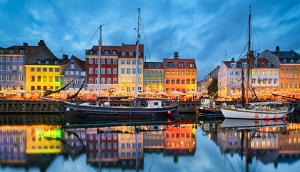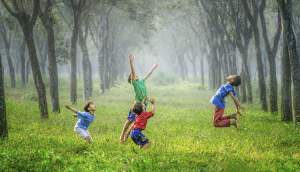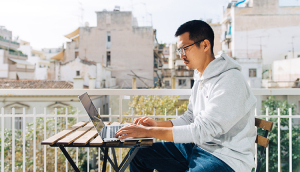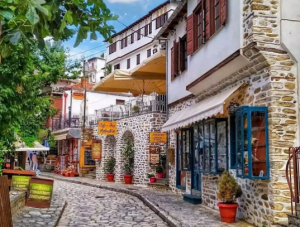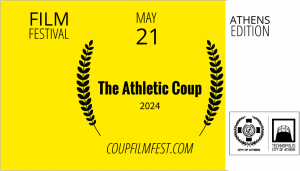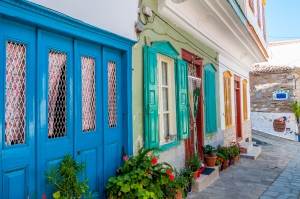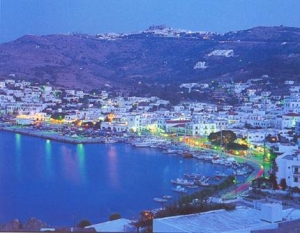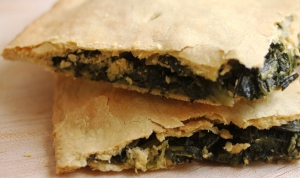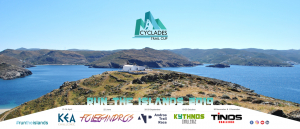XpatAthens
European Destinations That Are Better In The Wintertime
Visit Copenhagen during wintertime, and your vacation is definitely going to be great. A cosy Scandinavian feeling can be found throughout Copenhagen, from pastry shops to inviting hotels. You don’t have to stay indoors to enjoy the season, though. Copenhagen’s Michelin-starred restaurants, Tivoli Gardens, and canal views are certainly worth bundling up for. Oh, and the buildings of Nyhavn look even more colorful against a snowy background.
Venice has become so overrun during peak season that recently there have been attempts to limit tourist overflow. But come wintertime, the city actually lives up to its La Serenissima nickname. The canals are quiet and shrouded in mist, hotels offer discounted rates, and you can actually visit St. Mark’s Basilica in peace and quiet.
Winter is, hands down, the best time to visit Budapest. Seeing the Hungarian Parliament surrounded by ice drifts on the Danube will definitely make you embrace the cold! Budapest’s grand cafes, museums, and thermal baths will seem so much more welcoming after spending some time outdoors, exploring the city.
Things To Consider Before Sending Your Children Back To School
![]()
If there’s a topic you’re interested in and would like to learn more about you may contact me via email. For more information about me and my work check the XpatAthens Directory or visit my website. Because this is your life!
Family Driven Professional – Athens Corona Nomads Series
A Family Affair
Keita Yamada, 33, Japanese
Customer Support At Global Remote Work Facilitator Doist
One day last year, while I was working in Costa Rica, an overseas colleague and I started talking about which one place we could both move to where we could work together and enjoy a better lifestyle during the pandemic. She’s Italian but her boyfriend is Greek. They chose Athens and relocated in July. My ex-wife and daughter are also Greek, so we agreed that with Covid, it would be better for us all to be in Athens too, near her parents, to have the extra family support. We bought a one-way ticket and moved in September. I’m renting an air bnb in Piraeus within walking distance of Marina Zea, with a typically Athenian view of rooftops—and a bit of the sea too. I have no plans to leave Athens anytime soon. Working for a company that promotes more fulfilling ways to work and live, I’m very grateful for my job, because it really doesn’t matter where I am—or which hours I work.
In Costa Rica, we lived with similar restrictions to Greece, but when we first arrived in Athens, things felt freer and more normal. Our daughter was able to go to daycare again and I went to work each day at Impact Hub (a popular co-working space in Psirri). Compared to Costa Rica, Athens has a good bus and train system. That has really helped me to move around and see the city, and travel to work.
Before the lockdown, one of the things I enjoyed most about my new Athens life was walking around the different neighbourhoods after work and trying out restaurants and bars that I liked the look of. I must have been to the Strange Brew Taproom in Koukaki about 4 times, sampling all their local craft beers! Now, during lockdown, I am working from home, but I can still enjoy a walk around the sea and visit open places like Marina Zea and the Stavros Niarchos Foundation Cultural Centre parklands.

Photos: Thomas Gravanis
Going to my local laiki down the street to get fresh fish, fruit and vegetables—and pick up a few new Greek words with locals while I’m there—has become my new routine; and I can still get easy access to take-away souvlaki! I also enjoy watching my daughter engage with her Greek identity and the language, and spend quality time with her grandparents.
When lockdown is over, I want to get back to walking around the city; checking out all the great street art, and exploring the ruins. I’m originally from Miyazaki, in south Japan, and also lived in Tokyo for 3 years where it’s far more crowded and busy than Athens. Tourism is much more advanced here than Tokyo. Everything is available in English: signs, menus in restaurants. That’s an important advantage for the Japanese.
Because so many people speak English, compared to other European cities, getting around Athens and getting to know the city is easy. I have found the locals friendly and happy to help, once you ask questions. Any place you go in Athens they take pride in what they do, and explain things in detail. When I went to get my haircut recently, for example, the barber really threw himself into it. I can see that passion in every aspect of Athenian life.
To read more, please visit This is Athens
Whether you've just arrived in town – or have been here for years – Athens always has new secrets to share!
This is Athens is the official guide to this captivating city of ancient energies and booming urban culture. Compiled by a team of specialist local writers, This is Athens brings you an authentic and intimate portrait of a living Athens beyond the guidebooks – along with daily curated listings of all the best events and great weekend inspiration all-year round. From must-know neighbourhoods and emerging art hubs, to gourmet hotspots, cool shopping and the buzziest bars, This is Athens will help you to get the most out of living in Athens!
Thank you This is Athens for your contribution as an XpatAthens Partner.
Greece’s Fairytale Villages

Olympos, Karpathos

@samiappolonia
The traditional village of Olympos, on Karpathos, is special in many ways. Many travel here to experience the serenity of what seems to be a place where time has stood still; wandering around the village, you might see women working their looms, artists painting ceramic plates, or a cobbler at work on a pair of boots. But besides that, Olympos is also about as picturesque as villages come. The view of it from afar reminds us of legos on a hill, and the view from the balconies of the houses is unbeatable.
Pyrgi, Chios

@ozguroksuzz
On the island of Chios, there’s a group of traditional villages known worldwide as the “mastichohoria” (mastic villages), named for the mastic industry that long underpinned their economies. The most stunning of these villages is Pyrgi, famous for the black-and-white geometrical patterns on the village houses – “etchings” formed using the black sand from Mavra Volia and drawn with a fork on a thin undercoat of lime.
Makrinitsa, Pilio

@aba_tziz
Justifiably described as “the balcony of Pilio,” the views of Volos and the Pagasetic Gulf from Makrinitsa are unique, but your eyes are more likely to wander to the pretty stone buildings and the unusual rough stone paving on the streets, which is difficult to walk on (don’t wear heels here), but practical when it snows in the winter, and very pretty. In the square under the plane trees there is a marble fountain with four bronze lion heads; legend has it that its water confers immortality.
Mikro Horio & Megalo Horio, Evritania

@elladamesaapofotografies
On the hills above the town of Karpenissi, you’ll find the traditional settlements Megalo Horio (literally “big village’) and the old and new Mikro Horio (“small village”). The former is the most touristy, featuring cafés and pastry shops lining the main road as well as shops selling local products, catering mainly to the coach loads of visitors to the Monastery of Prousiotissa.
On the opposite hillside is the Palio Mikro Chorio (“old small village”), which was cut in two by a landslide in January of 1963, and retains architectural elements that make it much more interesting than Neo Mikro Chorio (“new small village”), which was built further down by the survivors who had lost their homes.
To read this article in full, please visit: greece-is.com
The Athletic Coup Announces Festival Start In Athens
Festival Highliths
-
Award-winning athlete documentaries
-
International filmmakers present
-
5 films
-
Filmmaker panels
-
English language or English subtitles
-
Technopolis City of Athens | Gasholder 1 Auditorium «Miltiadis Evert»
Sebastien Bellin, a former professional basketball player, is on his way to New York, departing from Brussels Airport. As he was receiving his boarding pass, a bomb exploded in the Brussels airport. As he runs toward security, a second bomb explodes a few feet away. Bellin nearly died in a terrorist attack on March 22, 2016.
This short documentary follows the remarkable journey of 72-year-old Australian climber, Ian Elliott. Ian's extraordinary climbing ability defies age stereotypes, showcasing his resilience and challenging societal perceptions.
Welcome To XpatAthens!
Patmos
Worldwide known as a sacred island for it is the place where Saint John wrote the Book of Revelation, Patmos is an ideal destination for nature lovers thanks to its lace-like coastline, sheer cliffs and volcanic soil. Designated as “Holy Island” by the Greek Parliament in 1981 as well as a World Heritage Site by UNESCO in 1999, Patmos had been used as a place of exile by the Romans on account of its steep morphology.
In the area of Hóra, little glittering white houses under the Aegean sun stand next to proud two-storey mansions. Follow the historical narrow streets all the way from the monastery down to Skála (the island’s port), and discover restaurants, cafés, shops and traditional bakeries. Treat yourselves with cheese pies, local dairy products, and reticule-shaped dough with honey and nuts.
The largest settlement, as well as capital and port of the island, is Skála where you will find accommodation and fresh-fish tavernas among buildings used by the Italians during the Italian Rule of the Dodecanese (1912-1943).
At 5km fromSkála have a rest stop at the village of Grikos, and enjoy the freshness of a drink by the sea,or even a swim at the beach by the same name.
For tan-seeking sunbathers:
The beach in Kámpos with sea sports facilities and marvelous fish tavernas is the most cosmopolitan one, whereas Psili Ammos (literally meaning “thin sand”) will offer you an off-the-beaten-track experience as it is accessible only by boat. For cool and not very salty waters the beach of Váya is definitely the choice, whereas Sapsilas with its warmer waters will be the refuge for the less courageous ones. The beach of Lámpi is very beautiful, covered with colourful pebbles. The very small and mainly uninhabited islets of Arkoi are absolutely worth a visit, so catch a boat from Skála, and make sure you call in at Maráthi for crystal clear waters and fresh delicious fish.
To read more, please visit visitgreece.gr
Moussaka Burgers
With the long weekend coming up I have been thinking about grilling and in particular about these moussaka burgers. Moussaka is a tasty Mediterranean dish that is typically made with layers of eggplant, meat, a tomato sauce and a cheese bechamel sauce and I have been wanting to try making burgers with these flavours for a while now.
I started the burgers off by making a tomato sauce with the hints of cinnamon and allspice that moussaka often has and then I moved on to make a simple bechamel sauce with plenty of melted melted cheese. Up next were the patties which I kept nice and simple, once again seasoning with hints of cinnamon and allspice, and the last component was slices of eggplant that I grilled along with the patties.
All said and done these burgers are amazingly good and they definitely taste like moussaka, only better! These burgers take a bit of time to make but you can easily make the sauces and patties a day ahead and then just warm the sauces and grill the patties and eggplant of the day of your get together with minimal effort. I served the moussaka burgers with a fresh Greek salad.
Servings: 4
Prep Time: 10 minutes - Cook Time: 45 minutes - Total Time: 55 minutes
INGREDIENTS
For the tomato sauce:
1 tablespoon olive oil
1 small onion, diced
2 cloves garlic, chopped
2 cups tomato (fresh or canned), pureed
1 teaspoon oregano
1/4 teaspoon cinnamon
1/4 teaspoon allspice
salt and pepper to taste
For the bechamel cheese sauce:
2 tablespoons butter
2 tablespoons flour
1 cup milk
1/2 cup graviera or gruyere or parmigiano reggiano (parmsan), grated
1/4 teaspoon nutmeg
1/8 teaspoon cayenne
salt and pepper to taste
For the burgers:
1 1/4 pounds ground beef or lamb
1/4 cup onion, grated
2 cloves garlic, chopped
1/4 teaspoon cinnamon
1/4 teaspoon allspice
salt and pepper to taste
4 slices eggplant
4 buns
DIRECTIONS
For the tomato sauce:
Heat the oil in a pan over medium heat, add the onion and cook until tender, about 5-7 minutes.
Add the garlic and cook until fragrant, about a minute.
Add the pureed tomato, oregano, cinnamon, allspice, salt and pepper and simmer until it thickens, about 5 minutes.
For the bechamel cheese sauce:
Melt the butter in a pan over medium heat and cook until it turns a light golden brown, about 2-3 minutes.
Add the flour and simmer until it turns a light golden brown, about 2-3 minutes.
Add the milk and simmer until it thickens, about 5 minutes.
Add the cheese and let it melt.
Season with nutmeg, cayenne, salt and pepper to taste.
For the burgers:
Mix the meat, onion, cinnamon, allspice, salt and pepper, form patties and grill or pan-fry over medium-high heat (or broil) until cooked, about 3-5 minutes per side.
Brush the eggplant with oil and grill or pan-fry over medium-high heat (or broil) until tender, about 5 minutes. Lightly toast the buns, assemble the burgers with the eggplant, patties, tomato sauce and cheese sauce and enjoy!
By Kevin Lynch
For more information, please visit www.closetcooking.com
Five Best Greek Foods You Should Be Eating Now
2. Greens. In Greece they are called horta. Wild greens are the best if you have the opportunity to find them, but cultivated ones will do just fine. This is a unique part of the Greek diet; eating wild plants and leafy greens, lightly boiled with a bit of olive oil and lemon. They are rich in vitamin A, C and calcium, but mainly in antioxidants that play a role in protecting against cancer and other chronic diseases.
How? Buy some leafy greens and boil them. Serve with lemon juice and olive oil, accompany with bread and a piece of feta cheese.
3. Cretan Barley Rusks-Paximadi. These barley rusks are not only a popular food in Crete and the rest of Greece but they are extremely good for you. The authentic Cretan rusks are made from 100% barley flour baked till they are hard. It is a source of whole grains, which means that keep you satisfied, and keeps your appetite under control. Several studies have shown that consumption of whole grain products (at least 3 servings a day) can reduce the risk of diabetes by 30 percent. Furthermore, research conducted by the USDA (U.S Department of Agriculture) showed that a diet rich in barley may reduce cholesterol levels. Barley contains tocotrienol, natural form of vitamin E, which inhibits the production of cholesterol. Finally, preliminary investigations showed that they might reduce the risk of ulcers.
How? Find them online or specialty markets. Soak the rusk in water, drizzle some olive oil, load with tomato and cheese and enjoy.
To read more and to get more recipes with these ingredients, visit Food and Leisure International Guide
Cyclades Trail Cup 2019
In its 4th consecutive year in 2019, Cyclades Trail Cup presents a new set of events in alternative destinations with original routes and exciting cultural experiences! Giving priority to some of the “near” Cycladic islands, the 2019 Championship will include 5 events in 5 destinations: Kea, Folegandros, Andros, Kythnos and Tinos.
Cyclades Trail Cup 2019 event schedule:
13 & 14 April – Kea Challenge
22 June – Folegandros Sunset Trail
28 & 29 September – Andros Trail Race
19 & 20 October – Kythnos Challenge
30 November & 1 December – Tinos Challenge
All Cyclades Trail Cup events have always cultural side events in order to offer all visitors a full and unique experience. Every event will promote sports and cultural experiences like archaeology, mythology, music, dance, gastronomy etc.
Always thinking about the environmental impact, all events in every destination are thoughtfully designed. Organizers are educating locals and visitors about the mountains, sea and recycling. The main goal for 2019 is to fully stop ‘one use plastics‘.


